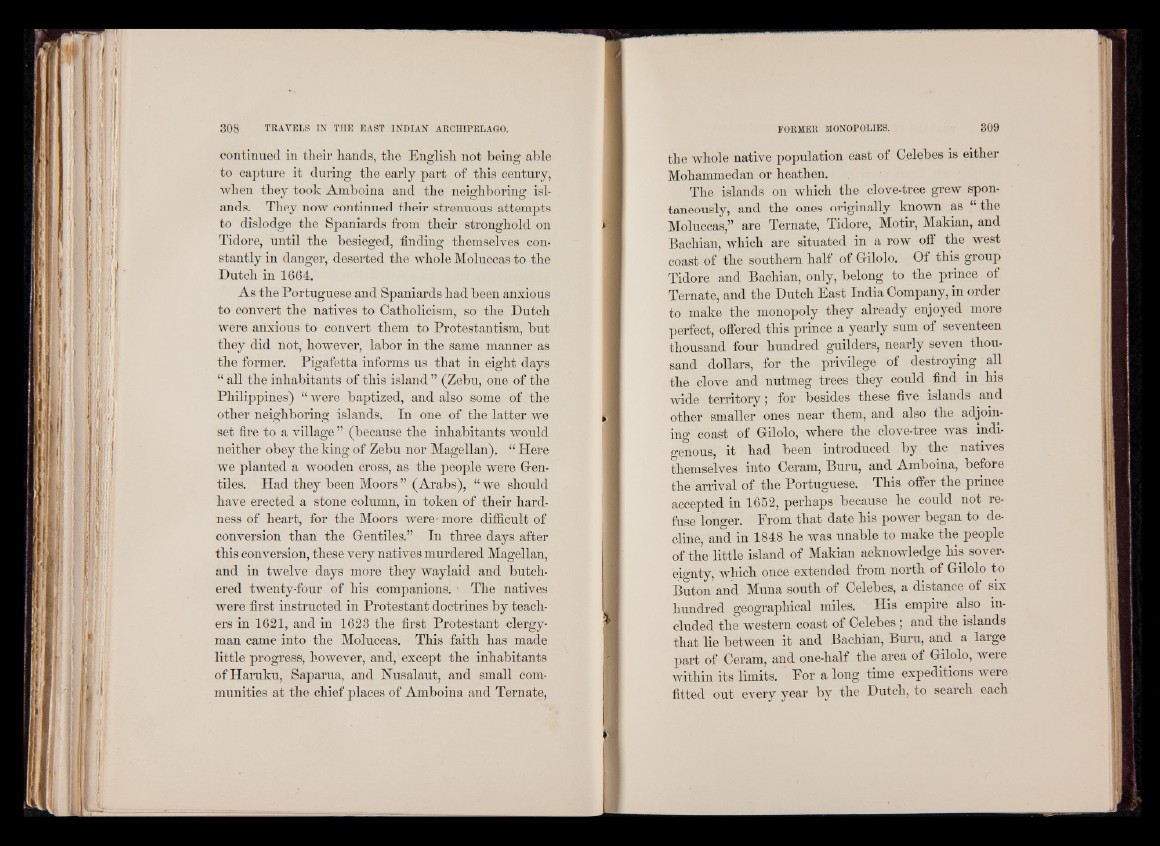
continued in their hands, the English not being able
to capture it during the early part of this century,
when they took Amboina and the neighboring islands.
They now continued their strenuous attempts
to dislodge the Spaniards from their stronghold on
Tidore, until the besieged, finding themselves constantly
in danger, deserted the whole Moluccas to the
Dutch in 1664.
As the Portuguese and Spaniards had been anxious
to convert the natives to Catholicism, so the Dutch
were anxious to convert them to Protestantism, but
they did not, however, labor in the same manner as
the former. Pigafetta informs us that in eight days
“ all the inhabitants of this island ” (Zebu, one of the
Philippines) “ were baptized, and also some of the
other neighboring islands. In one of the latter we
set fire to a village ” (because the inhabitants would
neither obey the king of Zebu nor Magellan). “ Here
we planted a wooden cross, as the people were Gentiles.
Had they been Moors ” (Arabs), “ we should
have erected a stone column, in token of their hardness
of heart, for the Moors were* more difficult of
conversion than the Gentiles.” In three days after
this conversion, these very natives murdered Magellan,
and in twelve days more they waylaid and butchered
twenty-four of his companions. ■ The natives
were first instructed in Protestant doctrines by teachers
in 1621, and in 1623 the first Protestant clergyman
came into the Moluccas. This faith has made
little progress, however, and, except the inhabitants
ofHaruku, Saparua, and Nusalaut, and small communities
at the chief places of Amboina and Ternate,
the whole native population east of Celebes is either
Mohammedan or heathen.
The islands on which the clove-tree grew spontaneously,
and the ones originally known as “ the
Moluccas,” are Ternate, Tidore, Motir, Makian, and
Bachian, which are situated in a row off the west
coast of the southern half of Gilolo. Of this group
Tidore and Bachian, only, belong to the prince of
Ternate, and the Dutch East India Company, in order
to make the monopoly they already enjoyed more
perfect, offered this prince a yearly sum of seventeen
thousand four hundred guilders, nearly seven thousand
dollars, for the privilege of destroying all
the clove and nutmeg trees they could find in his
wide territory; for besides these five islands and
other smaller ones near them, and also the adjoining
coast of Gilolo, where the clove-tree was indigenous,
it had been introduced by the natives
themselves into Ceram, Buru, and Amboina, before
the arrival of the Portuguese. This offer the prince
accepted in 1652, perhaps because he could not refuse
longer. From that date his power began to decline,
and in 1848 he was unable to make the people
of the little island of Makian acknowledge his sovereignty,
which once extended from north of Gilolo to
Buton and Muna south of Celebes, a distance of six
hundred geographical miles. His empire also included
the western coast of Celebes; and the islands
that lie between it and Bachian, Buru, and a large
part of Ceram, and one-half the area of Gilolo, were
within its limits. For a long time expeditions were
fitted out every year by the Dutch, to search each